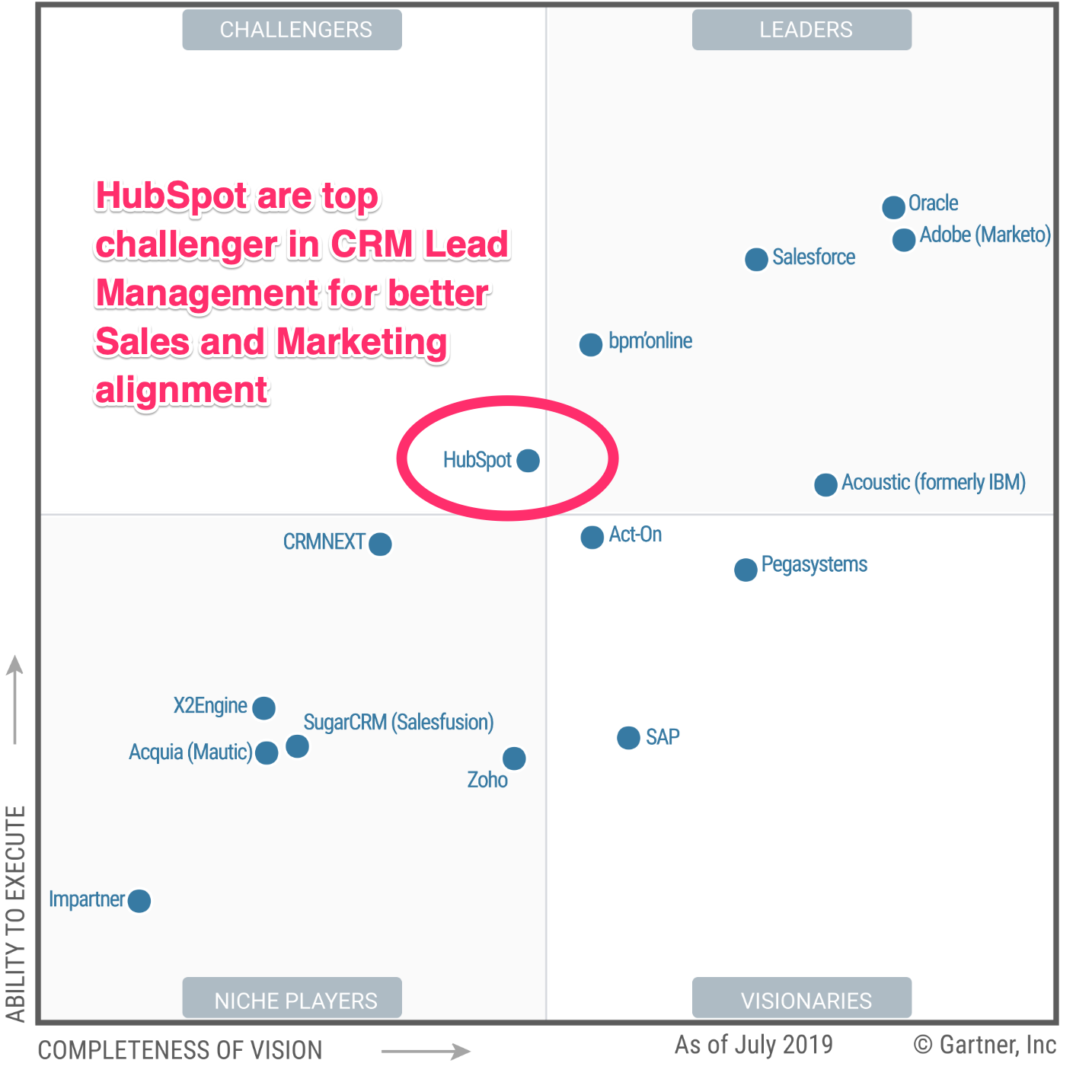Gartner 2019: HubSpot challenges in CRM Lead Management for Sales

What Is CRM Lead Management?
After your marketing efforts generate a lead, what happens to it? Your organization requires net new customers to continue to grow. Furthermore, you and your company invested money for generating leads; if they are not properly picked up, leads can easily get lost, discarded or even ignored. The most effective way to prevent leads from evaporating is to use a lead management application.
According to the report, Gartner have identified HubSpot as a contender to the crown for orchestrating lead management throughout an organisation. Leaders in the space include Adobe (Marketo), Salesforce and Oracle.
What is the difference Between Marketing Automation (B2C) and Lead Management (B2B)?
According to the report Gartner published in 2019, B2B lead generation caters to business enterprises and corporations; B2C lead generation caters to individual consumers.
These types of lead generation approaches differ wildly in their tactics. As customers, both have slightly different requirements when it comes to building a relationship with brands.
Key differences between marketing automation for B2C and lead management for B2B include:
- The sales cycle length: B2B lead generation requires investment in longer sales cycles and are often more elaborate than B2C campaigns
- Unique content: B2B customers typically need educational and well-informed content, including free case studies, infographics and white papers as they do more research before considering a purchase
- Audience scope: B2B sales and marketing need to target not only key decision makers inside a prospect's organisation but also influencers inside and outside their company to influence the decision.
- Social media: B2B marketers can leverage LinkedIn to reach decision makers and influencers as well as using other social media platforms to intelligently target their prospects where they spend the most time.
- Main challenge: While both B2B and B2C lead generation aim to result in a sale, B2C has to deal with a highly saturated market. A good B2B lead generation campaign attempts to build a personal relationship with prospects based on trust, so that when they are ready to make a purchase decision, your brand is the first thing that comes to mind.
- How products are sold: B2B clients often make purchases from people they know personally or from individuals with whom they’ve built a professional relationship. B2C products and services make sales through price perception and quality.
- Cold calls: Calls from salespeople are often expected during business hours in B2B. However, for B2C clients, unsolicited calls are often viewed as an invasion of their privacy. This is why B2C marketers rely more on permission marketing techniques to reach out to their audiences.
- Price: When B2B clients respond, they often have the intention of making a purchase within an allocated budget. In B2B, lowest price guarantee is an expectation, not a bonus.
- Product knowledge: B2B marketers deal directly with decisions makers who might have follow-up questions or concerns that need to be addressed right away.
- Interaction: B2C deals with individuals who make the purchase decisions. On the other hand, B2B marketers often deal with teams of people that may influence the decision-making process.
While each of the leading vendors provide an excellent platform for growth, HubSpot Growth Stack remains the platform of choice for SMBs (Small to Medium size businesses). HubSpot is especially important to companies looking to grow their company at scale without the commitment in time, investment and resources required to implement the bulkier, more complex players in the market. An integrated CRM with a superior user experience means HubSpot is fast approaching critical mass as it challenges the market for new customers tired of customisations or more expensive service offerings and favouring ease of use and team adoption overall.
HubSpot moves into the Challengers quadrant this year, based on execution and positive feedback from reference customers. It targets mainly small and midsize B2B organizations (up to 500 users) with a SaaS-based platform that includes marketing automation, free-to-use CRM/SFA and customer success tools. It has a strong presence in several verticals, including high tech, media, professional services and retail, and supports both B2B and B2C use cases. Although the bulk of its customers manage lead databases with up to 25,000 contacts, the platform is flexible enough to support larger implementations. - Gartner report on CRM Lead Management 2019.
Gartner measured each vendors capabilities in the following areas:
- Multichannel lead management
- Lead aggregation
- Lead augmentation and deduplication
- Lead process management
- Lead nurturing
- Lead scoring and qualification
- Analytics and measurement
- Integration with other applications
HubSpot is brilliant for small to medium size businesses looking to control each of these areas, while adding their own internal workflows and processes easily through the app marketplace and integrations. In addition, as a cloud software provider, HubSpot continues to develop in each of these with a newly announced app marketplace, a rapidly expanding Sales Hub and a Service Hub for managing customer success.
HubSpot is priced for a growing business and offers ease-of-use and superior user experience as part of a platform that encourages non-technical users to adopt the technology as soon as it is introduced to your sales and marketing organisation.
By showing value quickly, HubSpot is able to make a huge impact on the sharing and processing of valuable leads from marketing to sales and beyond.
If you'd like to learn more about how to use HubSpot for lead management in your organisation for better hand-off of leads from Marketing to Sales, get in touch today for a free audit of your sales system to see if there's a fit for you to modernise your sales organisation.
